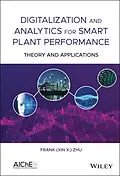This book addresses the topic of integrated digitization of plants on an objective basis and in a holistic manner by sharing data, applying analytics tools and integrating workflows via pertinent examples from industry. It begins with an evaluation of current performance management practices and an overview of the need for a "Connected Plant" via digitalization followed by sections on "Connected Assets: Improve Reliability and Utilization," "Connected Processes: Optimize Performance and Economic Margin " and "Connected People: Digitalizing the Workforce and Workflows and Developing Ownership and Digital Culture," then culminating in a final section entitled "Putting All Together Into an Intelligent Digital Twin Platform for Smart Operations and Demonstrated by Application cases."
Autorentext
Frank (Xin X.) Zhu, PhD, is Senior Engineering Fellow and Leader of Engineering Innovations at Honeywell UOP. He has made significant contributions to the theoretical framework, the computational tools, and applications in the fields of data analytics, production planning, operation scheduling, process modeling, design and optimization. He has published seminal journal articles and widely used books especially in the areas of process operations, process design and energy systems. He holds 68 US patents, is the co-founder and chair of ECI International Conference: CO2 Summit, and the recipient of prestigious AICHE Energy Sustainability Award.
Klappentext
Provides a digital and analytic solution platform for integrating business and technical activities to enhance profit, reliability, safety, and performance for manufacturing plants via Connect Plantcovers data science theory, digital tools, and industrial applications
The Connected Plant is a suite of digital applications integrating data sources and advanced analytics to make intelligent predictions to guide decisions in order to run production processes more efficiently, safely and create new value. Furthermore, Connect Plant can digitalize workforce and work processes so that complex tasks can be accomplished automatically while plant staff can have more time on decision-making. Collecting real-time data, the Connected Plant enables continuous monitoring, optimization, and control of key plant operating parametersconnecting people, processes and assets much better than traditional digital solutions. Digitalization and Analytics for Smart Plant Performance is the first book to focus solely on digitalization and analytics for the process industries, explaining the principles and practices necessary for successful transformation to Smart Plant performance and intelligent workforce.
The book demystifies digitalization and data science for industrial application, and explains the next-generation digital solutions that enhance business capabilities, improve asset management, optimize workflow management, and turn data from multiple sources into actionable insights. Working with other subject matter experts in the field, the author Frank Zhu, a pioneer for key indicator-based operation optimization and molecular analysis based process synthesis, provides step-by-step guidance on analytics modeling and optimization models, data infrastructure, implementation strategies, and much more. Frank sheds much light onto digital twina virtual plant, which is a digital platform consisting of rigorous and analytics models and multi-sourced data to mimic the real plant. More importantly, digital twin can analyze what-if scenarios, predicting what's wrong events and determining what's best conditions to achieve smart plant performance.
Offering timely and authoritative coverage of all vital aspects of industrial digitalization, this book:
Digitalization and Analytics for Smart Plant Performance: Theory and Applications is required reading for corporate and plant managers, process and control engineers, and data scientists, as well as operators working in process industries worldwide. This book could be excellent reading for university professors and students to understand how to apply data science and Big Data theory for practical applications in the process industries.
Inhalt
Preface xiii
Acknowledgments xvii
Part 1 Challenges and Opportunities For Digitalization 1
1 Challenges for Operation Excellence 3
1.1 Introduction 3
1.2 Operation Activities in a Process Plant 4
1.3 The Major Challenges Facing the Industries 5
1.4 The Methodology of Connected Plant 11
1.5 Digitalization Enabling Connected Plant 12
1.6 What is the Digitalization Journey? 18
1.7 Overview of the Book Structure 19
References 21
2 Mission of Connected Plant 23
2.1 What is Connected Plant? 23
2.2 Major Functions of Connected Plant 24
2.3 Digital Twins: The Core of Connected Plant 27
2.4 Conclusions 32
References 33
3 Data Analytics for Operation Excellence 35
3.1 Introduction 35
3.2 Process Data Overview: Characteristics and Attributes 37
3.3 Unique Attributes of Process Data Analytics 39
3.4 Model Types and Characteristics 40
3.5 First Principle Modeling and its Characteristics 42
3.6 Statistic Modeling and its Characteristics 45
3.7 Optimization Models 47
3.8 Artificial Intelligence (AI) and Machine Learning (ML) Models 50
3.9 Put All Together: Digital Twin as a Data Science Platform 55
References 59
Part 2 Model Thinking For Smart Operations 63
4 Statistics Basics 65
4.1 Introduction 65
4.2 Normal Distribution 65
4.3 Conditional Probability 72
4.4 Bayes' Probability 73
4.5 Statistic Tests 75
References 84
5 Advanced Statistic Modeling 85
5.1 Introduction 85
5.2 Distribution Models 85
5.3 Correlation Models 94
5.4 Advanced Modeling Techniques 101
5.5 Data Mining 106
5.6 Summary 107
References 107
6 Rigorous Process Modeling 109
6.1 Introduction 109
6.2 Reaction Kinetic Modeling 110
6.3 Reactor Types and Modeling 126
6.4 Integrated Kinetics and Reactor Modeling 131
6.5 Catalyst Deactivation Root Causes and Modeling 135
6.6 Distillation Modeling 136
6.7 Process System Modeling and Simulation 138
6.8 Separation Technology Overview 142
References 144
7 Linear Optimization Modeling 147
7.1 Introduction 147
7.2 Linear Optimization for Planning 148
7.3 How to Deal with Nonlinear Terms? 151
7.4 Delta Vector as Linear Approximation of Nonlinear Yield Models 154
7.5 Successive Linear Programing (SLP) Approach 159
References 160
8 Nonlinear Optimization Modeling 161
8.1 Introduction 161
8.2 Successive Quadratic Programming (SQP) Approach 162
8.3 Local Versus Global Optimum 162
8.4 Optimality Conditions 166
8.5 Nonlinear Process Optimiz…
